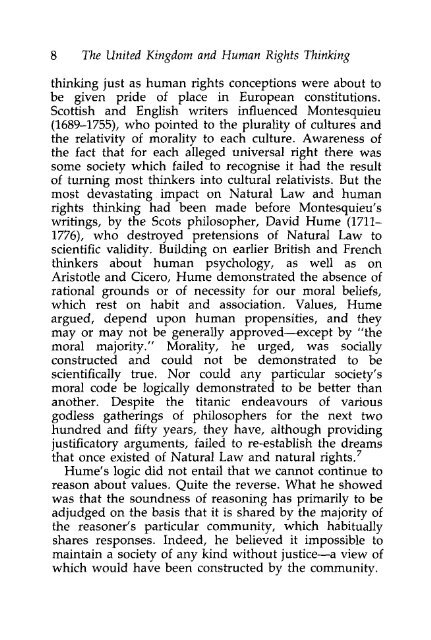The United Kingdom and Human Rights - College of Social ...
The United Kingdom and Human Rights - College of Social ...
The United Kingdom and Human Rights - College of Social ...
You also want an ePaper? Increase the reach of your titles
YUMPU automatically turns print PDFs into web optimized ePapers that Google loves.
8 <strong>The</strong> <strong>United</strong> <strong>Kingdom</strong> <strong>and</strong> <strong>Human</strong> <strong>Rights</strong> Thinking<br />
thinking just as human rights conceptions were about to<br />
be given pride <strong>of</strong> place in European constitutions.<br />
Scottish <strong>and</strong> English writers influenced Montesquieu<br />
(1689-1755), who pointed to the plurality <strong>of</strong> cultures <strong>and</strong><br />
the relativity <strong>of</strong> morality to each culture. Awareness <strong>of</strong><br />
the fact that for each alleged universal right there was<br />
some society which failed to recognise it had the result<br />
<strong>of</strong> turning most thinkers into cultural relativists. But the<br />
most devastating impact on Natural Law <strong>and</strong> human<br />
rights thinking had been made before Montesquieu's<br />
writings, by the Scots philosopher, David Hume (1711-<br />
1776), who destroyed pretensions <strong>of</strong> Natural Law to<br />
scientific validity. Building on earlier British <strong>and</strong> French<br />
thinkers about human psychology, as well as on<br />
Aristotle <strong>and</strong> Cicero, Hume demonstrated the absence <strong>of</strong><br />
rational grounds or <strong>of</strong> necessity for our moral beliefs,<br />
which rest on habit <strong>and</strong> association. Values, Hume<br />
argued, depend upon human propensities, <strong>and</strong> they<br />
may or may not be generally approved—except by "the<br />
moral majority." Morality, he urged, was socially<br />
constructed <strong>and</strong> could not be demonstrated to be<br />
scientifically true. Nor could any particular society's<br />
moral code be logically demonstrated to be better than<br />
another. Despite the titanic endeavours <strong>of</strong> various<br />
godless gatherings <strong>of</strong> philosophers for the next two<br />
hundred <strong>and</strong> fifty years, they have, although providing<br />
justificatory arguments, failed to re-establish the dreams<br />
that once existed <strong>of</strong> Natural Law <strong>and</strong> natural rights. 7<br />
Hume's logic did not entail that we cannot continue to<br />
reason about values. Quite the reverse. What he showed<br />
was that the soundness <strong>of</strong> reasoning has primarily to be<br />
adjudged on the basis that it is shared by the majority <strong>of</strong><br />
the reasoner's particular community, which habitually<br />
shares responses. Indeed, he believed it impossible to<br />
maintain a society <strong>of</strong> any kind without justice—a view <strong>of</strong><br />
which would have been constructed by the community.

















